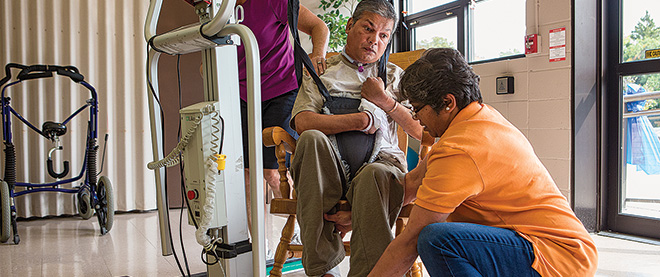Testing ‘brain vital signs’
In 2010, Winifred Rodrigues woke in the middle of the night to what sounded like snoring, but wasn’t. She turned the light on and found her husband next to her, gasping for air. He had suffered a major heart attack. Due to the brain injury that resulted, doctors diagnosed him as being in a vegetative state, completely unaware of his surroundings. Yet Rodrigues thought that her husband, Leonard, with whom she has two kids, was still there. “Let’s put it bluntly, he was not dead,” she says. “Just holding his hand, I could feel it.”
Related: Inside a comatose mind
Jennifer Roberts
Share

In 2010, Winifred Rodrigues woke in the middle of the night to what sounded like snoring, but wasn’t. She turned the light on and found her husband next to her, gasping for air. He had suffered a major heart attack. Due to the brain injury that resulted, doctors diagnosed him as being in a vegetative state, completely unaware of his surroundings. Yet Rodrigues thought that her husband, Leonard, with whom she has two kids, was still there. “Let’s put it bluntly, he was not dead,” she says. “Just holding his hand, I could feel it.”
Related: Inside a comatose mind
Rodrigues, who spends every day with her husband at the hospital in Brantford, Ont., contacted Ryan D’Arcy, a neuroscientist and professor at Simon Fraser University. D’Arcy has developed a tool named the Halifax Consciousness Scanner (HCS), a portable medical device that assesses brain activity—taking a sort of “brain vital sign,” he says. Based on electroencephalography (EEG), the test is fully automated and can quickly assess whether the brain is functioning, even moments after injury occurs. “We put the [headset] on, hit go, and the test runs in five minutes.” (It plays auditory tones and verbal stimuli to check neural responses for sensation, perception, attention, memory and language, then analyzes and presents the results.)
In January 2012, D’Arcy brought the HCS, which is still in prototype phase, to Brantford. “I had to be realistic that he may not find anything,” says Rodrigues. When D’Arcy tested Leonard, he showed all the HCS neural responses or indicators. “It validated what I knew from day two,” says Rodrigues. “Not from day one, because that day was a blur.” Yet, if the tests had shown otherwise, “it would have been difficult, but I was prepared.”
The HCS is being developed by Mindful Scientific, a company of which D’Arcy is chief scientific advisor. Just as defibrillators are in shopping malls and airports, “I imagine a technology for brains right beside them,” hopefully soon, he says. “It will have a huge impact for patients in a vegetative state.”
After all, studies suggest that 43 per cent of patients who are diagnosed as vegetative are in fact at least minimally conscious. Whether or not Leonard Rodrigues is one of them, his diagnosis has remained the same. His wife continues to work with him daily. “There’s fight in him, which is why I’m working so hard to help him,” she says. “He could give up. But he’s not.”